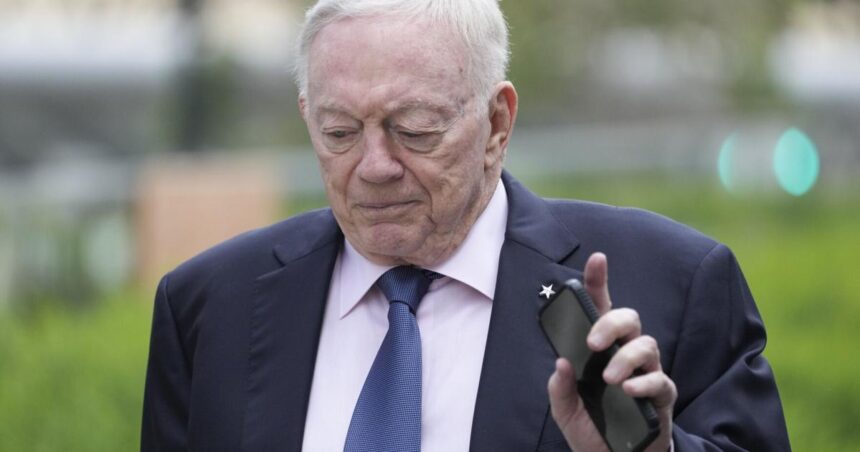TOPEKA, Kan. — Kansas legislators approved a bipartisan plan on Tuesday with the aim of enticing the Kansas City Chiefs away from Missouri by assisting in the funding of a new stadium for the Super Bowl champions.
The bill, passed by the Republican-controlled Legislature and sent to Democratic Gov. Laura Kelly, would enable Kansas to issue bonds to cover up to 70% of the costs of a new stadium in the state for the Chiefs and another for Major League Baseball’s Kansas City Royals. The plan also encourages the teams to relocate their practice facilities to the Kansas side of the metropolitan area, which is divided by the border of the two states.
Kansas would repay its bonds over a 30-year period using revenues generated from sports betting, Kansas Lottery ticket sales, and new sales and alcohol taxes collected from shopping and entertainment districts around the sites of the new stadiums.
Korb Maxell, an attorney for the Chiefs residing on the Kansas side of the border, expressed optimism, stating that the state’s lawmakers were embracing the potential of attracting the Chiefs and the Royals with a “very compelling offer” now available to the NFL team.
People are also reading…
“We’re excited about what happened here today,” he said after the bill cleared the Legislature. “This is incredibly real.”
The votes were 84-38 in the House and 27-8 in the Senate. Kelly stopped short of saying she’ll sign the stadium-financing bill, but in a statement, she praised the effort behind it.
“Kansas now has the opportunity to become a professional sports powerhouse,” she said.
Kansas legislators see the two teams as in play because in April, voters on the Missouri side of the Kansas City metropolitan area refused to extend a sales tax used to keep up the teams’ existing stadiums, which sit side by side.
Top Republicans in the GOP-controlled Legislature had promised that the stadium proposal wouldn’t be debated until the Legislature approved a plan that would cut income and property taxes by a total of $1.23 billion over the next three years. Many lawmakers argued that voters would be angry if the state helped finance new stadiums without cutting taxes.
“We definitely need to demonstrate that we’re getting relief to our citizens,” said Senate President Ty Masterson, a Wichita-area Republican who backed the stadium-financing plan.
Kelly called a special session to have lawmakers consider reducing taxes after she vetoed three tax-cutting plans before legislators adjourned their regular annual session on May 1. Once legislators convened the special session, Kelly couldn’t control what they considered, and that created an opening to consider the stadium-financing plan.
The initial version of the plan emerged in late April, but lawmakers didn’t vote on it before adjourning. It would have allowed state bonds to finance all stadium construction costs, but the version passed by lawmakers Tuesday would cap the amount at 70% and require legislative leaders and the governor to sign off on any bonding plan.
House Commerce Committee Chair Sean Tarwater, a Kansas City-area Republican, said the Chiefs are likely to spend between $500 million and $700 million in private funds on a new stadium.
“There are no blank checks,” Tarwater told GOP colleagues during a briefing on the plan before the House began debating it.
A new nonprofit group, Scoop and Score, formed last month to push for bringing the Chiefs to Kansas, and that group and the Royals together hired more than 30 lobbyists for the special session. But the national free-market, small-government group Americans for Prosperity and the Kansas Policy Institute, a free-market think tank, oppose the measure, and both have been influential with conservative Republicans.
Free-market conservatives have long opposed state and local subsidies for specific businesses or projects. And economists who’ve studied pro sports teams have concluded in dozens of studies over decades that subsidizing their stadiums isn’t worth the cost.
“Most of the money that gets spent on the Chiefs is money that would otherwise be spent on other entertainment projects,” said Andrew Zimbalist, an economics professor at Smith College in central Massachusetts who has written multiple books about sports.
Missouri officials have said they’ll do whatever it takes to keep the teams but haven’t outlined any proposals.
“The story now is that today was largely in my opinion about leverage,” Kansas City, Missouri, Mayor Quinton Lucas said. “And the teams are in an exceptional leverage position.”
The two teams’ lease on their stadium complex runs through January 2031, but Maxwell said renovations on the team’s Arrowhead Stadium should be planned seven or eight years in advance.
“There is an urgency to this,” added David Frantz, the Royals’ general counsel.
‘Sunday Ticket’
The federal judge presiding over the class-action lawsuit filed by “Sunday Ticket” subscribers against the NFL voiced frustrations with the way the plaintiffs’ attorneys have handled their side of the case.
Before Dallas Cowboys owner Jerry Jones took the stand Tuesday for a second day of testimony, U.S. District Judge Philip Gutierrez said the premise of the case was simple and that it had gone in direction that it shouldn’t.
The class-action covers 2.4 million residential subscribers and 48,000 businesses who paid for the package from the 2011 through 2022 seasons.
The lawsuit claims the league broke antitrust laws by selling its package of Sunday games aired on CBS and Fox at an inflated price.
Ticket deposits
The Washington Commanders have settled the final lawsuit they were facing over their handling of season-ticket deposits under previous ownership.
The $1.3 million settlement with Virginia includes returning $600,000 to fans. It follows the team settling similar suits with Maryland and the District of Columbia.
Virginia Attorney General Jason Miyares said the state’s investigation found the team unlawfully retained security deposits for years after they should have been returned to consumers.
Dan Snyder was the owner at the time. A group led by Josh Harris bought the Commanders last year.
BRIEFLY
BEARS: Chicago signed veteran receiver and return specialist DeAndre Carter to a one-year contract. The 31-year-old Carter has 108 receptions for 1,259 yards and six touchdowns over six seasons with Philadelphia, Houston, Chicago, Washington, the Los Angeles Chargers and Las Vegas Raiders. He has averaged 9.8 yards on punt returns, and 22.4 yards with one touchdown on kickoff returns.
LIONS: Detroit signed all-United Football League kicker Jake Bates, who made three field goals from at least 60 yards for the Michigan Panthers this past season. The Lions added depth at a position with veteran Michael Badgley. Undrafted rookie James Turner was released. Turner kicked for Michigan’s national championship team last season after transferring from Louisville.





